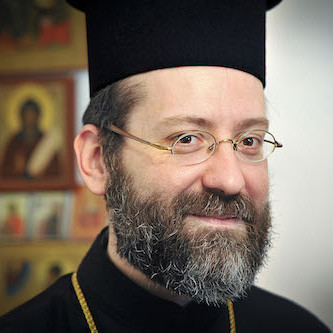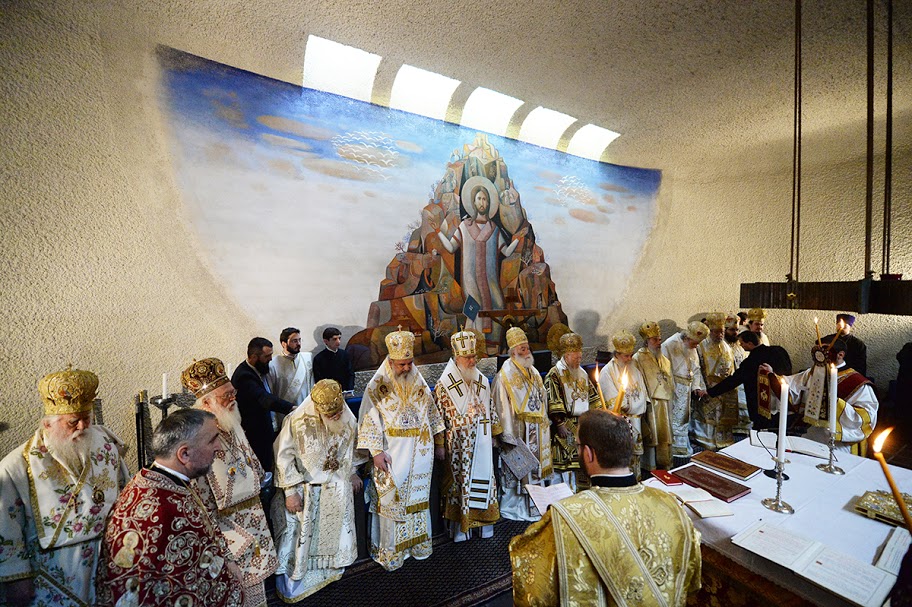Your Eminence, the Holy and Great Council of the Orthodox Church was supposed to meet on Crete in two weeks. We heard that the Church of Bulgaria will not participate, and we don’t know if the Patriarchate of Antioch will participate. The Church of Russia has also expressed some reserves. Do you think that the Council will meet?
Archbishop Job of Telmessos: The Holy and Great Council has been convoked by His All-Holiness the Ecumenical Patriarch with the consent of the Primates of the Orthodox Church gathered together last January in Chambésy, near Geneva. We all heard with great sorrow the statements made by the Holy Churches of Antioch, Russia and Bulgaria.
The Ecumenical Patriarchate is making everything possible to solve these questions. But we have to remember from Church history that Councils were precisely convened to solve problems in a conciliar way. Sometimes some Churches have even been absent from Councils. For example, the Third Ecumenical Council, in Ephesus in 431, started in the absence of the delegation from Antioch.
We have to remember from Church history that Councils were precisely convened to solve problems in a conciliar way
But this council has resolved the ecclesiastical crisis of that time. A council is a continuous process: before it, there is the process of preparation, and after it, even more important, is the process of reception.
Why do you think the Orthodox Church needs to meet in Council this year on Crete? Why is this necessary in such conditions?
Church is the manifestation of unity in Christ. The culmination of a century of preparation is synchronised with a worldwide, multidimensional crisis that tests our solidity.
The Council was initiated by the Encyclical of Ecumenical Patriarch Joachim III in 1902, inviting the Primates of the Orthodox Autocephalous Churches to collaborate in order to face the problems concerning the Orthodox Church at that time.
Ecumenical Patriarch Athenagoras revived the idea of convening a Council after the Second World War. The Pan-Orthodox Pre-Conciliar Conferences that met in Chambésy near Geneva between 1976 and 2015 prepared the themes for the Council over the last 40 years.
What about the participation at the Holy and Great Council?
It is true that since the 4th Ecumenical Council, the one that met in Chalcedon in 451, the participants of the Councils were mostly the hierarchs of Constantinople, to whom were added some representatives from other Churches. Today, the Orthodox Church is organised in 14 autocephalous Churches, which include the 4 ancient patriarchates, the ancient Church of Cyprus and the Church of Russia.
We have to keep in mind that all the documents were elaborated on the basis of contributions from every Orthodox Autocephalous Church and approved unanimously on a pan-Orthodox level
This means that 8 new Churches were established since the end of the nineteenth century! At the upcoming Holy and Great Council, each of the 14 autocephalous Churches shall be sending a delegation composed of her Primate and 24 bishops, accompanied by 6 advisors and 3 stewards. Each Church will have a voice in a decision making based on the principle of unanimity.
How is the agenda connected to the Laity?
The First Pan-Orthodox Pre-Conciliar Conference of Chambésy in 1976 selected ten concrete subjects which are related everyday life of the Orthodox Christians. The Synaxis of the Primates of the Orthodox Churches met in Chambésy in January 2016 decided by consensus to retain six items on the agenda of the Council. Among these, most of them are relevant to people’s everyday lifre.
The question of Orthodox diaspora, which deals with the organisation of the life of Orthodox Christians that are living in Western Europe, North and South America and in Oceania. The text on the sacrament of marriage and its impediments responds to many pastoral problems, like marriage of Orthodox Christians with non-Orthodox Christians.
The document on the importance of fasting and its observance today responds to questions, how people should fast today. The text on the relationship of the Orthodox Church with the rest of the Christian world is particularly important for people that are living in countries where the Orthodox are a minority.
The document on the mission of the Orthodox Church in the contemporary world deals with questions of the dignity of the human person, of freedom, of peace and justice, of discrimination – which concern every human being in society.
Why is there such turmoil about the documents as well as objections on behalf of the Churches regarding the right to disagree?
We have to keep in mind that all the documents were elaborated on the basis of contributions from every Orthodox Autocephalous Church and approved unanimously on a pan-Orthodox level.
The text reflects the consensus reached. The process of the preparation of these documents was long and complex. It implied many preparatory meetings, and a lot of correspondence between the Churches and the secretariat, to which they were suppose to send their remarks.
They were finally approved by pan-orthodox pre-conciliar Conferences convened by the Ecumenical Patriarch. Therefore, these documents are not new. Very often, the objections we hear come from a fear of some hierarchs or Churches to be confronted to some marginal people that disagree with the official positions of the Churches.
As you mentioned, one of the documents to be discussed at this council deals with the relations with the rest of the Christian world. Could we consider these communities as Churches?
Having in mind that the Orthodox Church is ontologically the One, Holy, Catholic, and Apostolic Church, the document entitled “The relations of the Orthodox Church with the rest of the Christian world” acknowledges the existence of other Christian Churches, not in communion with her, and stresses the necessity of engaging into a theological dialogue with them in order to restore unity.
The canonical tradition of the Orthodox Church acknowledges circumstances when it recognises that sacraments could be celebrated outside her strict canonical limits
The Encyclical of Ecumenical Patriarch Joachim III raised already in 1902 the question of ecumenical relations and theological dialogue with non-Orthodox Churches. In this encyclical, the Roman Catholics and the Protestants are addressed as “Churches”. Actually, the canonical tradition of the Orthodox Church acknowledges circumstances when it recognises that sacraments could be celebrated outside her strict canonical limits.
What’s in your opinion the most important mission of the Holy and Great Council?
The most important mission of the Holy and Great Council will be to witness the unity of the Orthodox Church worldwide.
In a world that is at the same time globalized and divided, people thirst for this unity. Unfortunately, we all know from the media about the tensions that exist between the Churches of Constantinople and Russia, Antioch and Jerusalem, and about some reservation that the Churches of Bulgaria or Georgia might have. But the Orthodox Church as a whole, as the One, Holy, Catholic, and Apostolic Church must gather together in council in order to solve her problems and to manifest her unity to the world. We know from Church history that each time when the Church went through difficulties, she gathered in a council.
In a world that is at the same time globalized and divided, people thirst for this unity
Therefore, unity is not a prerequisite of a council. On the contrary, if there are problems or difficulties, we must gather in council in order to discuss and solve these problems as brothers, and in this way, manifest to the world that we are one Church.
Read the interview in Greek.

